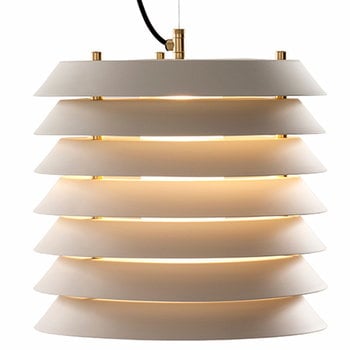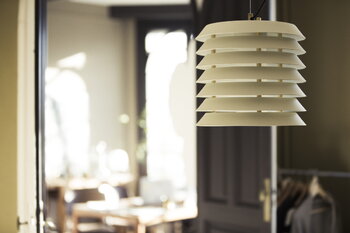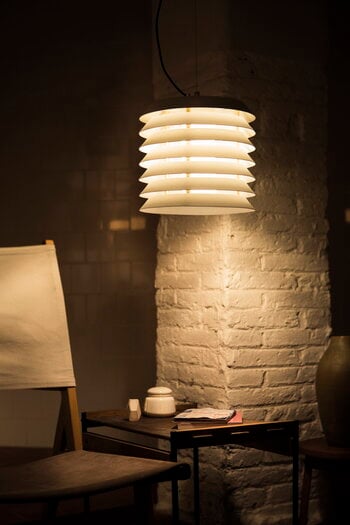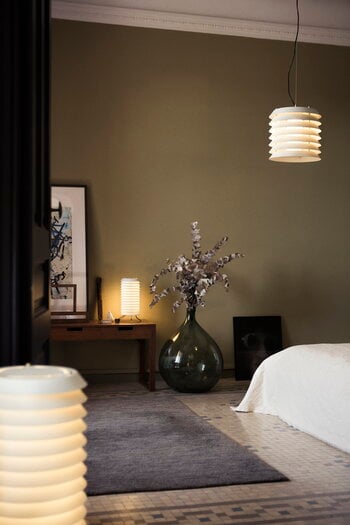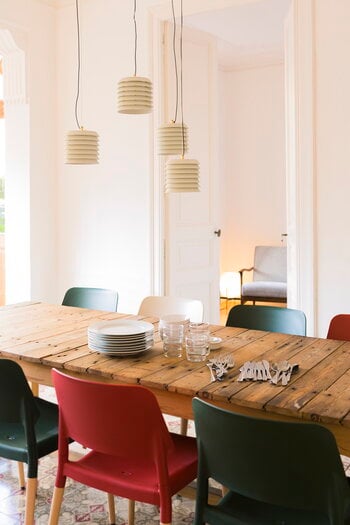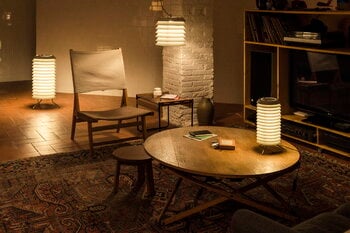Santa & Cole has launched a re-edition of the timeless Maija Mehiläinen lamps, designed by Ilmari Tapiovaara in 1955. The Finnish designer drew his inspiration for the table, pendant and floor lights from Waldermar Bonsels’ children’s book Maya the Bee (Maija Mehiläinen in Finnish), which is evident in the distinct, beehive-like form. Composed of superimposed metal discs that filter light beautifully, the lamps provide a pleasant ambience. The Maija lights are part of the Spanish brand’s Design Classics collection and available in white and the original nude rose hue.
Maija 30 pendant, white
Santa & Cole
Description
Santa & Cole has launched a re-edition of the timeless Maija Mehiläinen lamps, designed by Ilmari Tapiovaara in 1955. The Finnish designer drew his inspiration for the table, pendant and floor lights from Waldermar Bonsels’ children’s book Maya the Bee (Maija Mehiläinen in Finnish), which is evident in the distinct, beehive-like form. Composed of superimposed metal discs that filter light beautifully, the lamps provide a pleasant ambience. The Maija lights are part of the Spanish brand’s Design Classics collection and available in white and the original nude rose hue.
Product details (18)
- Material
- Matte finished metal shade, brass structure
- Colour
- White
- Width
- 11.81 in (30 cm)
- Diameter
- 11.81 in (30 cm)
- Height
- 11.02 in (28 cm)
- Light source
- Integrated dimmable 8.4W LED
- Colour temperature
- 2,700 K
- Luminous flux
- 329 lm
- Lifetime
- 40,000 h
- IP rating
- 20
- Protection class
- I
- Voltage
- 100–230 V
- Nominal frequency
- 50–60 Hz
- Certifications and labels
- CE marked: tested and approved according to European standards
- Cable length
- 118.11 in (300 cm)
- Weight
- 6.39 lbs (2.9 kg)
- Ceiling plug
- No
- Dimmable
- Yes. Suitable for dimming 1-10V. (External dimmer switch 1-10V not included).
- Product ID
Designer
Ilmari Tapiovaara (1914-1999) was a renowned Finnish interior architect and designer. In his designs, Tapiovaara always sought to create a humane, well-lit and warm dwelling environment. Tapiovaara’s furniture pieces designed were always part of a whole, with the architecture as their starting point.
Read moreReviews (0)
Sustainability
The Product Sustainability Framework, our criteria of sustainable design, helps you find the most sustainable products in our selection. Read below which sustainability criteria this product has met.
Working conditions & labour 9/9
-
Equal opportunities for all employees
-
Commitment to UN Global Compact, fair compensation for all employees
-
Corporate responsibility requirements defined and communicated for suppliers
-
Systematic work for improved inclusion and well-being in the workplace
-
Transparent supply chain
-
Suppliers' compliance to a code of conduct ensured
-
Direct suppliers audited and certified
-
Compliance to the UN Guiding Principles on Business and Human Rights ensured in the supply chain
-
Support for community involvement in the supply chain
Eco-friendly production 9/9
-
Fair and resource-wise water-use in production
-
No incineration or landfilling of returned items
-
No use of endangered species as materials
-
No direct environmental emissions or waste (excl. GHGs) from production
-
The sustainability of direct suppliers' production is addressed and monitored
-
Production and material sourcing that respect biodiversity, animal rights, and natural ecosystems
-
Material-efficient and ecological packaging
-
Positive impact on nature’s well-being through operations that regenerate natural ecosystems
-
No potentially harmful chemicals used in own production
Climate impact 7/8
-
Company's direct greenhouse gas emissions identified and commitment to reduction
-
Product's carbon impact identified and commitment to reduction
-
Guidance on energy- and eco-efficient use of the product
-
Contribution to climate initiatives beyond the brand’s direct operations
-
Low-carbon or compensated transportation
-
Carbon footprint of the product calculated and goals set to reduce it
-
Carbon neutral or carbon negative product
Sustainable materials 6/6
-
Sustainable and long-lasting material choices
-
No harmful or hazardous substances
-
Responsible raw material sourcing and production
-
Materials suited for circularity: monomaterials, recyclable finishings, renewable or recycled contents etc.
-
Ecological materials: natural, biodegradable, recyclable or recycled contents
-
Outstanding materials in terms of innovativeness, responsibility, sustainability and circularity: local production or sourcing, 100 % recycled content, C2C-certification etc.
Circular design 5/5
-
High aesthetic quality promoting long-term use of the product
-
Technically durable product design and material choices
-
Design for enduring life-long quality
-
Design and support for product maintenance, repair and upgradability
-
Innovative circular design solutions: circular service system, resale platform, remanufacturing, collection of used products, etc.

